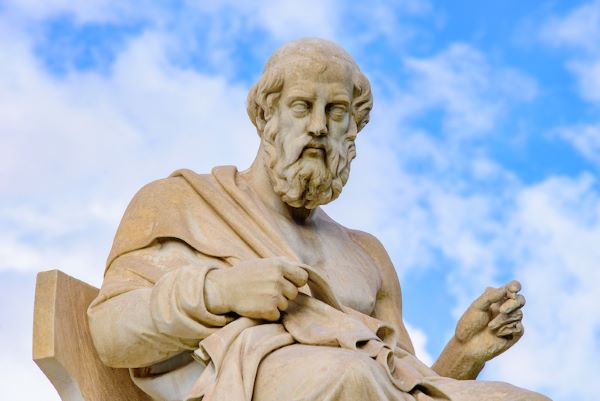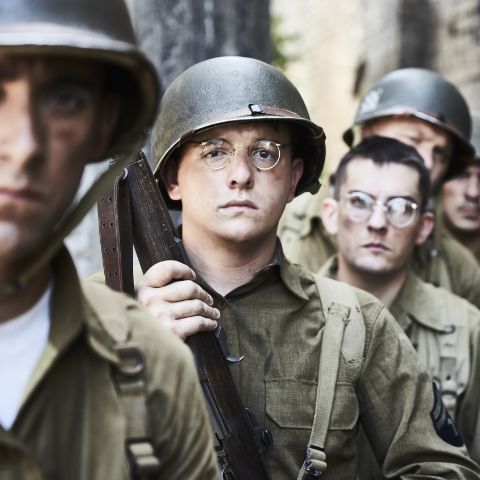Arts and Humanities – A Cornerstone of Knowledge
Pursuing study in an arts and humanities discipline (also known as the liberal arts) will always provide a strong foundational education. From English, sociology, and education to military history, government, philosophy, and religion, the programs in the arts and humanities cover the depth and breadth of the human experience. You will be prepared – not only for wherever your journey takes you next, but for the people and challenges you meet along the way.
A liberal arts major will equip you with skills to both navigate and lead in the socially and culturally tuned-in environment and workplace of today. You will learn to be a critical thinker, to be more innovative, to tackle problems in more unique ways, and to do it all with an eye toward teamwork, community-building, and empathy.
And an arts and humanities education provides a foundation for learning as well as a gateway to your professional future. You are free to explore a multitude of undergraduate and graduate programs and career paths.

Today’s Students, Tomorrow’s Leaders: Critical Thinking and Communication
In today’s hyperconnected society, communication has never been more important to personal, professional, and academic pursuits. This is true for critical thinking, too. Information is flowing constantly. So, students need the tools to sort the noise from the actual signal. The ability to think critically and communicate effectively, in combination, may be what separates today’s leader from the pack. In terms of skill building, a liberal arts major, at its very core, is about teaching students critical thinking and effective communication.
From oral and written communication to research, creativity, and problem-solving, classes prepare students to analyze and interpret all forms of real-world communication — from emails to white papers and social media — and produce them effectively.
What Do Arts and Humanities Graduates Do Out In The “Real World”?
The following list of disciplines within the liberal arts and what corresponding graduates could do professionally might surprise you. Here is a selection of degrees, who pursues them, and what they hope to do with them:
Communication or English
With a strong foundation in writing and communication strategies, students who graduate with a degree in communication or English are well-suited to a variety or marketing, publishing, and public relations roles. This can include:
- Reporter or journalist
- Technical writer or copywriter
- Editor
- Event planner
- News anchor or announcer
- Human resources manager
- Social media manager
- Marketing manager
- PR specialist
Humanities
Students with an education in the humanities have a well-rounded, interdisciplinary skill set that can take them in a number of directions. However, a lot of students who graduate with this major often seek positions that take advantage of their cultural studies training, such as:
- Curator
- Archivist
- Teacher (this requires special licensure)
- Education administrator (this requires an advanced degree)
- Historian
- Human resources manager
- Counselor (this requires special licensure)
- Social worker (this requires special licensure)
- Public relations specialist
- Art director
- Writer
History or Ancient and Classical History
Keen research skills and attention to detail are what mark those who graduate with a major in history, and the roles they seek are often detail oriented as well:
- Conservator
- Historic building inspector
- Teacher (this requires special licensure)
- Professor (this requires an advanced degree)
- Museum curator
- Archivist
- Archeologist
- Anthropologist
- Librarian
- Writer
- Editor
- Paralegal
Military History, World War II Studies, or Civil War Studies
With specialized historical knowledge, students with a degree in military history, WWII studies, or Civil War studies can explore the same things more general historians do – professor, teacher, curator, writer, and editor. However, the added focus does open up more specific paths, such as:
- Intelligence specialist
- Park naturalist
- Political science teacher
- Tour guide
- Genealogist
- Researcher
Philosophy
Thanks to the emphasis on critical thinking and contextual analysis, this major prepares students for work that requires problem-solving and interpretation. This includes:
- Teacher (this requires special licensure)
- Paralegal
- Communications manager
- Policy analyst
- Corporate trainer
- Counselor (this require special licensure)
- Chaplain
- Consultant
- School principal (this requires an advanced degree)
- Professor (this requires an advanced degree)
Political Science or Sociology
A world of opportunity awaits those with both a foundation in history and the workings of social or political systems, and that’s just what students with a degree in political science or sociology get. Individuals in these roles typically pursue study in political science or sociology:
- Economist
- Historian
- Lawyer (this requires an advanced degree)
- Political scientist (this requires an advanced degree)
- Legislative assistant
- Political consultant
- Political campaign staff
- Intelligence analyst
- Research analyst
- Policy analyst
- Project manager
- Teacher (this requires special licensure)
- Mediator
- Urban planner
Psychology
Students who graduate with a major in psychology are well equipped to deal with people, and this means managing teams. However, management is not the only profession that is particularly well-suited to psychology. Individuals in these roles may have earned a psychology degree:
- Mental health technician
- Coach
- Human resources manager
- Sales manager
- Marketing manager
- Social services manager
- PR manager
- Counselor (this requires special licensure)
- Career counselor (this may require special licensure)
- Parole officer
- Social worker (this requires special licensure)
Study in the arts and humanities is – perhaps uniquely – well-suited to military service, especially those in, or looking to move into, positions of leadership.
Programs like psychology, communication, American history, family studies, sociology, religion, military history, life coaching, and English teach skills the military is looking for.
According to several think pieces written for publications like The Atlantic, the Chicago Tribune, and the Washington Post, the armed services see the humanities as uniquely positioned to prepare future officers. Even the U.S. Naval Institute’s monthly magazine, Proceedings, draws a straight line between the professional development of military leaders, those who are getting the most out of themselves and their teams, and a liberal arts education.
An arts and humanities education offers servicemembers the ability to think critically and solve problems creatively; a wider, more culturally in-tune, understanding of the world around them; and a greater sense of empathy. From leadership and operational management to strategy and logistics, study in an arts and humanities discipline can help prepare a servicemember for just about anything within the military and beyond.
American Military University (AMU) is among the quality providers of higher education for the U.S. military and veterans. We are an online university founded to address the unique needs of active-duty and transitioning servicemembers. AMU prides itself on providing affordable and accessible education for our nation’s military.
AMU's Top Arts and Humanities Programs
All Related Programs
Some Marketable Skills You’ll Learn
What you take away from a liberal arts education can vary widely depending on the program you choose. However, all the disciplines have a core set of skills in common that are transferable in today’s fast-paced world of social media, influencers, emails, and streams.
Here are the top skills you will develop, regardless of the program:
Critical Thinking
The ability to creatively think beyond the surface of any problem, situation, or circumstance – an invaluable career and life skill.
Contextual Analysis
You will graduate with the ability to analyze any given problem or situation while considering how a multitude of factors could impact that problem or situation.
Innovative Problem-Solving
With the combined abilities to think critically, discover, create, and consider context, you will become an innovative problem solver – someone with a unique perspective.
Communication
Being able to communicate efficiently, effectively, and appropriately is one of those rare skills that is universally sought, if not required, no matter the industry or sector.
Research
The amount of information that humanity is creating (and has access to) year after year is staggering. Being able to sift through it, discern what’s useful from what’s not, and present it to the community and others in a meaningful way is increasingly important.
Project Management
No matter what program in the liberal arts you choose, it will invariably involve a combination of group projects, individual work, research papers, persuasive essays, forum responses, and more. In other words, you will be asked to tackle a lot of different projects, with different requirements and deadlines.
Adaptation
Gone are the days of the 50-year career in the same job with the same company. Even if you stay with the same organization for the entirety of your career, your duties will certainly evolve, probably radically. This is where an arts and humanities background comes in. You will learn to adapt to a multitude of tasks, ideas, and situations. As a student of the liberal arts, you will learn how to learn, quickly.
Related Student Organizations
AMU provides opportunities for student networking via clubs and honor societies. The University has multiple student organizations related to the arts and humanities, including:
- Historical Studies Honor Society – promoting the study of history
- Lambda Pi Eta Club Honor Society – recognizing achievement in communication studies
- Paranormal Activities Club – promoting the investigation of paranormal phenomena
- Performing Arts Enthusiasts and Practitioners – engaging fine arts enthusiasts, including artists, music lovers, theater performers, and dancers
- Photography Club – promoting the study of photography
- Psychology Club – engaging members who are studying psychology
- R.E.A.D. Book Club – advancing members' recognition of great books
- Saber and Scroll Historical Society – advancing the knowledge of history
- Sigma Tau Delta Honor Society – promoting the English language in all its forms
Arts and Humanities Resources

How Are Philosophy and Religion Related? Differing Views

Why Study Religion? 5 Reasons to Pursue the Study of Religion

What Can You Do with a Bachelor’s Degree in Psychology?

Additional Arts and Humanities Resources
Frequently Asked Questions
The discipline is vast and varied, but most broadly covers visual arts, drama, dance, music, literature, religion, philosophy, and history. More specifically, it can cover anthropology, psychology, philosophy, foreign languages, gender studies, women’s studies, world religions, art history, film, political science, and sociology. And in some instances, the arts and humanities will include English, communication, and education.
According to the Harvard Business Review, employers overwhelmingly value a liberal arts degree with vast majority preferring “innovation in response to rapid change,” rather than “narrow technical training.”
The courses you can expect to take will vary widely depending on the discipline, however, most college students (not just those pursuing liberal arts) will take arts and humanities classes in writing, literature, history, art criticism, and communication. The vast majority of courses that can be classified as liberal arts will involve, on some level, the interpretation, analysis, and criticism of primary and secondary sources along with research and writing.
If you are interested in learning more about the online arts and humanities degrees offered by American Military University, be sure to check out the complete list of programs. If you have any questions, we have advisors ready to assist you.
And remember, courses start monthly.





